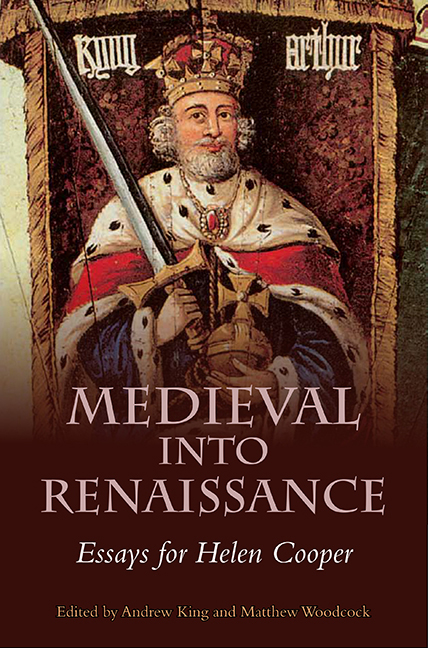Book contents
- Frontmatter
- Contents
- List of Illustrations
- List of Contributors
- Acknowledgments
- Abbreviations
- Introduction
- Unknowe, unkow, Vncovthe, uncouth: From Chaucer and Gower to Spenser and Milton
- Armour that doesn't work: An Anti-meme in Medieval and Renaissance Romance
- ‘Of his ffader spak he no thing’: Family Resemblance and Anxiety of Influence in Fifteenth-Century Prose Romance
- Writing Westwards: Medieval English Romances and their Early Modern Irish Audiences
- Penitential Romance after the Reformation
- The English Laureate in Time: John Skelton's Garland of Laurel
- Thomas Churchyard and the Medieval Complaint Tradition
- Placing Arcadia
- Fathers, Sons and Surrogates: Fatherly Advice in Hamlet
- ‘To visit the sick court’: Misogyny as Disease in Swetnam the Woman-Hater
- The Monument of Uncertainty: Sovereign and Literary Authority in Samuel Sheppard's The Faerie King
- Mopsa's Arcadia: Choice Flowers Gathered out of Sir Philip Sidney's Rare Garden into Eighteenth-Century Chapbooks
- Bibliography
- Index
- A Bibliography of Helen Cooper's Published Works
- Tabula Gratulatoria
Mopsa's Arcadia: Choice Flowers Gathered out of Sir Philip Sidney's Rare Garden into Eighteenth-Century Chapbooks
Published online by Cambridge University Press: 05 July 2016
- Frontmatter
- Contents
- List of Illustrations
- List of Contributors
- Acknowledgments
- Abbreviations
- Introduction
- Unknowe, unkow, Vncovthe, uncouth: From Chaucer and Gower to Spenser and Milton
- Armour that doesn't work: An Anti-meme in Medieval and Renaissance Romance
- ‘Of his ffader spak he no thing’: Family Resemblance and Anxiety of Influence in Fifteenth-Century Prose Romance
- Writing Westwards: Medieval English Romances and their Early Modern Irish Audiences
- Penitential Romance after the Reformation
- The English Laureate in Time: John Skelton's Garland of Laurel
- Thomas Churchyard and the Medieval Complaint Tradition
- Placing Arcadia
- Fathers, Sons and Surrogates: Fatherly Advice in Hamlet
- ‘To visit the sick court’: Misogyny as Disease in Swetnam the Woman-Hater
- The Monument of Uncertainty: Sovereign and Literary Authority in Samuel Sheppard's The Faerie King
- Mopsa's Arcadia: Choice Flowers Gathered out of Sir Philip Sidney's Rare Garden into Eighteenth-Century Chapbooks
- Bibliography
- Index
- A Bibliography of Helen Cooper's Published Works
- Tabula Gratulatoria
Summary
In book two of the New Arcadia, the ignorant peasant girl Mopsa tells a story to the royal ladies Philoclea, Pamela and Zelmane:
In time past, […] there was a king (the mightiest man in all his country) that had by his wife the fairest daughter that ever did eat pap. Now this king did keep a great house, that everybody might come and take their meat freely. So one day, as his daughter was sitting in her window […] there came a knight into the court upon a goodly horse […]. And so, the knight, casting up his eyes to the window, did fall into such love with her that he grew not worth the bread he eat; till many a sorry day going over his head, with daily diligence and grisly groans he wan her affection.
The tactful and generous Philoclea, wanting to show some appreciation for Mopsa's effort without actually bestowing undeserved praise, interrupts: ‘Now good Mopsa […] I pray thee at my request keep this tale till my marriageday, and I promise thee that the best gown I wear that day shall be thine.’ Such kindly patronage has generally been the lot meted out to the chapbook retellings of stories from the Arcadia by critics, not entirely dismissive of these Arcadian afterlives, yet conscious that they do not capture the multifaceted brilliance of the original. Dennis Kay, for instance, describes them as ‘cheap and crude retellings’ which, however, ‘forcefully demonstrate the degree to which Sidney's stories were still read into the eighteenth century’.
But these texts reveal more about how Sidney was read in the long eighteenth century than the bare fact of his being read at all. As John Simons writes in his edition of Guy of Warwick and other Chapbook Romances, ‘it is true that chapbooks do not speak to a world thronged by readers who were conversant with high literary culture’, but far from appealing only to the ‘reader of low sophistication and intellect’, these texts could ‘stimulate an internal commentary and debate on the values [they] enshrined’ and their producers and readers served as ‘culture brokers’ to their society.
- Type
- Chapter
- Information
- Medieval into RenaissanceEssays for Helen Cooper, pp. 235 - 250Publisher: Boydell & BrewerPrint publication year: 2016

